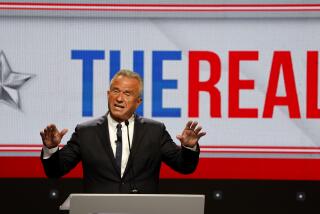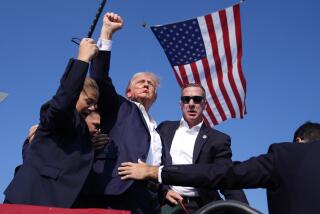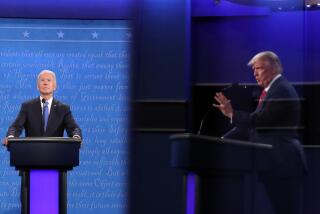Clinton Effect Seen as Transitory
Bill Clinton’s emphatic return to the spotlight has created short-term opportunities for both parties but is unlikely to affect the long-term dynamics of the presidential race, Republican and Democratic strategists agree.
In the near term, Democrats hope Clinton’s high-profile reemergence around the publication of his memoirs will boost John F. Kerry, the presumptive Democratic nominee, by focusing attention on the economy’s strong performance during Clinton’s tenure.
Many Republicans, though, are optimistic that Clinton’s publicity tour will help President Bush by energizing the conservative base that detests the former president, and by reminding less partisan voters about the relationship with intern Monica S. Lewinsky that led to his impeachment.
The consensus in both parties is that Clinton’s resurfacing, much like the death this month of former President Reagan, won’t affect many voters’ decisions as the spotlight inexorably returns to the two men vying for president.
“Come October the focus is going to be squarely on John Kerry and George W. Bush, and the Clinton book tour and the Reagan death are going to be a distant memory,” said Democratic media consultant David Axelrod.
Unlike Reagan, though, Clinton promises to be a visible presence in this race until the end. Indeed, his confidantes expect that he will play a much more prominent role in 2004 than he did in 2000, when then-Vice President Al Gore mostly kept him at arm’s length, partly because he feared that the Lewinsky scandal had tainted Clinton with swing voters.
Kerry seems much more eager than Gore to employ Clinton as a fundraiser and surrogate, particularly with core Democratic constituencies such as African Americans, advisors to both Kerry and Clinton say. “They are anxious to have him participate,” said one Clinton confidante.
The ideas under discussion include plans for a Clinton speech at the Democratic National Convention in late July, probably on the first of its four nights.
Kerry recently told reporters that he welcomed the president’s book and tour.
“I think that both are going to remind Americans about some very, very good years in terms of the economy of our country and the policy directions we took -- and even as people will also remember that the president made a terrible mistake that he acknowledges,” Kerry said. “I’m very happy to have the president out there reminding people about the direction that we could go in with different leadership.”
But conservatives appear just as eager to keep Clinton in the news, believing that he motivates their base at least as much as he excites core Democrats.
“As unifying a force as Bush has been, nothing galvanizes conservatives the way Bill and Hillary Clinton do,” said conservative public relations consultant Keith Appell.
Polls taken over the last few days mostly show the public expressing the same split verdict on Clinton that it did in the final years of his presidency. An ABC/Washington Post survey released Tuesday showed Americans divided almost exactly in half on whether they had a favorable personal view of Clinton. But 62% gave him positive ratings for his job performance as president.
As in 2000, the challenge for the Democrats may be to benefit from the positive assessments of Clinton’s performance without suffering from the disenchantment with his personal behavior. The likelihood, though, is that both effects will be more diffuse this year than in the last election.
“Clinton is part of history now,” Axelrod said.
Clinton never entirely receded from view after leaving office. But his exposure will increase enormously over the next few weeks amid a round of book signings and interviews to promote his memoir, “My Life.”
His book tour will focus heavily on states where Kerry is already strongly favored -- such as California, New York and Illinois. But it will also carry Clinton to battleground states such as Pennsylvania, Florida and Washington, as well as Arkansas and Colorado, two Bush states from 2000 that Kerry hopes to contest.
Although the former president has spoken on several occasions with Kerry and his top aides, Clinton advisors say he has not coordinated his message during the tour with the Massachusetts senator.
Republicans have been cheered, and some Democrats privately dismayed, by the extent to which Clinton’s initial appearances have concentrated on his affair with Lewinsky and his feelings about his impeachment.
“The thing that I would not have anticipated going into the book is how completely and thoroughly his legacy is dominated by impeachment and Monica Lewinsky,” said one GOP operative familiar with thinking in the Bush campaign. “That event of his presidency is defining the coverage of his book and his reemergence onto the center stage of American life.”
But even most Republican strategists agree that the Clinton scandals are unlikely to have any effect on voter perceptions of Kerry, who is much less closely connected to the former president.
“Kerry is too far away from him,” said Scott Reed, the campaign manager in 1996 for Bob Dole, Clinton’s GOP opponent. “I don’t think Kerry wears any of the negative Clinton baggage.”
Republicans are somewhat more optimistic that the renewed attention to Clinton’s impeachment could remind some voters about qualities they liked in President Bush, particularly his frequent promise in 2000 to restore integrity and honesty to the Oval Office.
Yet Clinton partisans insist they are eager for such a discussion, noting that Bush’s ratings for honesty and integrity have slipped significantly in recent months amid fierce debate over whether he exaggerated the evidence over Iraq’s weapons of mass destruction and Saddam Hussein’s links to Al Qaeda.
John Podesta, a former Clinton chief of staff, says he thinks that after an initial focus on Lewinsky, the former president will have more opportunity in later interviews to highlight his policy record -- and to create an implicit contrast with Bush on issues such as the federal deficit, job creation and the reduction of poverty.
“Kerry’s economic and domestic policies are well lined up with Clinton’s philosophy. So that just by going out and talking about what he was trying to accomplish, Clinton reminds people there is a different way from the way Bush has proceeded, and it produced better results,” said Podesta, president of the Center for American Progress, a Democratic think tank.
But just as Democrats say they are ready to compare Clinton’s integrity with Bush’s, Republicans say they are prepared to debate Clinton’s policy legacy.
One conservative group aired ads last weekend criticizing the former president’s record on fighting terrorism. And the Bush campaign Tuesday released a study arguing that on a lengthy list of indicators -- such as unemployment and job growth in the election year -- the economy today is at least as strong as it was at this point in 1996, when Clinton won reelection.
“John Kerry should not be allowed in the middle of a presidential campaign to rhetorically criticize the Bush economy as the worst since the Great Depression, and then reminisce about the glory of the Clinton economy when the numbers and the economic indicators are substantively the same,” said Steve Schmidt, a spokesman for the Bush reelection campaign.
All of these competing arguments should provide plenty of tinder for talk radio and cable television over the next month. But, “Will all this be mostly forgotten by October?” said Democratic pollster Paul Maslin. “Sure.”
Times staff reporter Michael Finnegan contributed to this report.
More to Read
Get the L.A. Times Politics newsletter
Deeply reported insights into legislation, politics and policy from Sacramento, Washington and beyond. In your inbox three times per week.
You may occasionally receive promotional content from the Los Angeles Times.










